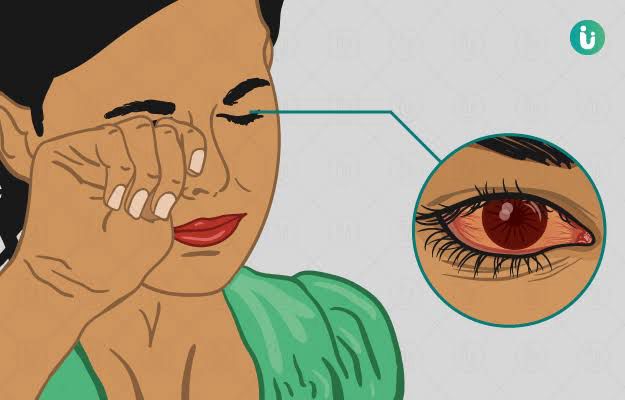Allergic conjunctivitis is a common condition characterised by inflammation of the conjunctiva—the thin membrane covering the eye and inner eyelids. It occurs due to an allergic reaction to airborne allergens, leading to uncomfortable symptoms. Understanding the causes, symptoms, and effective prevention and treatment strategies is essential for managing allergic conjunctivitis.
Causes: Allergic conjunctivitis is primarily triggered by exposure to allergens such as pollen, pet dander, mold spores, and dust mites. When these allergens come into contact with the eyes, the immune system releases histamines, leading to inflammation and various symptoms.
Symptoms: Common symptoms of allergic conjunctivitis include:
- Itchy or watery eyes
- Redness and swelling
- Burning or stinging sensation
- Light sensitivity
- Gritty feeling in the eyes
Prevention:
1. Identify and Avoid Allergens: Determine specific allergens triggering your symptoms and take steps to minimise exposure. Try to stay indoors during peak allergy seasons.
2. Use Protective Eyewear: When outdoors, especially during high pollen seasons, wear sunglasses to shield your eyes from allergens. Wrap-around styles provide additional protection.
3. Keep Indoor Environment Clean: Regularly clean and dust your home to reduce indoor allergens. Use air purifiers and consider using allergen-proof bedding to minimise exposure while sleeping.
4. Limit Contact with Pets: If you’re allergic to pet dander, limit contact with furry pets. Wash your hands thoroughly after interacting with animals and keep them out of bedrooms.
5. Avoid Irritants: Steer clear of smoke and other irritants that can worsen allergic symptoms. Maintain good indoor air quality by ensuring proper ventilation.
Treatment:
1. Topical Antihistamines: Over-the-counter or prescription eye drops containing antihistamines can provide relief from itching and redness. These are often recommended for mild to moderate cases.
2. Artificial Tears: Lubricating eye drops can help alleviate dryness and wash away allergens from the eye’s surface. They provide comfort without exacerbating allergic reactions.
3. Cold Compresses: Applying a cold compress can reduce swelling and soothe irritated eyes. Use a clean cloth or cold eye mask for 10-15 minutes at a time.
4. Oral Antihistamines: Non-drowsy oral antihistamines can provide systemic relief from allergic symptoms. Consult with a healthcare professional to determine the most suitable option.
5. Prescription Medications: In severe cases, prescription medications such as corticosteroid eye drops or immunomodulators may be prescribed to manage inflammation. These require careful monitoring by a healthcare provider.
6. Avoid Eye Rubbing
Managing allergic conjunctivitis involves a combination of prevention strategies and appropriate treatment options tailored to the severity of symptoms. Identifying and avoiding triggers, maintaining a clean environment, and seeking timely medical advice are key components of effective allergic conjunctivitis care. If symptoms persist or worsen, consulting with an eye care professional is crucial for a personalized and effective treatment plan.

Leave a Reply